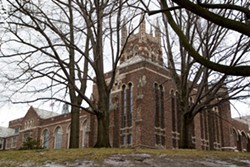A state judge has dismissed a lawsuit from neighbors of the former Colgate Rochester Crozer Divinity School campus who were trying to stop plans to redevelop the property.
 A coalition of Divinity School neighbors filed a lawsuit against the city of Rochester and developer Angelo Ingrassia in September. The group argued that the city’s environmental review of the project was inadequate and they asked the judge to annul a city decision that rezoned the property, claiming it was arbitrary.
A coalition of Divinity School neighbors filed a lawsuit against the city of Rochester and developer Angelo Ingrassia in September. The group argued that the city’s environmental review of the project was inadequate and they asked the judge to annul a city decision that rezoned the property, claiming it was arbitrary.
Members of the group have said that they were worried that Ingrassia’s plans for the property, which include two new four-level apartment buildings and reusing existing structures for office and event space, would be disruptive to the neighborhood.
State Supreme Court Justice Ann Marie Taddeo issued her decision Tuesday in response to a motion from the city and Ingrassia seeking dismissal of the case. She ruled against every claim made by the neighbors and wrote that the conclusions of the environmental review were supported by “substantial evidence” and were lawful.
The neighbors are deciding whether to appeal the decision, said Mindy Zoghlin, the attorney who represented them.
"Obviously we're very disappointed with the decision," Zoghlin said Thursday.
In her decision, Taddeo wrote that the neighbors didn’t make a compelling argument that the city and developer “failed to take a hard look at the relevant environmental concerns." The neighbors also “failed to show, beyond a reasonable doubt, that the City’s actions were unconstitutional or in violation of its Comprehensive Plan.”
"Basically the judge is saying they looked at all these different impacts,” said Alan Knauf, the attorney who represented Ingrassia. “You may not agree with the way that it came out, but they complied with the law by reviewing things and the fact that they made changes is a good thing, not a bad thing."
For example, Ingrassia promised not to develop the sweeping hillside on South Goodman Street and Highland Avenue after neighbors and groups expressed their opposition to the idea.
Ingrassia now owns the 22-acre site. During several neighborhood meetings last year he laid out his plans to redevelop the campus. At the time Ingrassia said that he plans to market the existing buildings as office space, conference and banquet rooms, and a senior living facility.
The site plan for the campus, which the city has approved, includes two new four-level apartment buildings.
He’s also worked with the Landmark Society of Western New York on his plans for the historic site. The campus’s Montgomery House, Swasey Library, Colgate Memorial Chapel, Strong Hall, Jones Hall, Trevor Hall, and Eaton Hall were designated as a city landmark in 2017. James Gamble Rogers designed the buildings’ Collegiate Gothic architecture and Alling DeForest designed the landscape.
Jeremy Moule is CITY's news editor. He can be reached at [email protected].

- FILE PHOTO
- Angelo Ingrassia, who now owns the former Colgate Rochester Crozer Divinity School campus, plans to redevelop its buildings for office and event use. He also plans to construct two apartment buildings on the site.
Members of the group have said that they were worried that Ingrassia’s plans for the property, which include two new four-level apartment buildings and reusing existing structures for office and event space, would be disruptive to the neighborhood.
State Supreme Court Justice Ann Marie Taddeo issued her decision Tuesday in response to a motion from the city and Ingrassia seeking dismissal of the case. She ruled against every claim made by the neighbors and wrote that the conclusions of the environmental review were supported by “substantial evidence” and were lawful.
The neighbors are deciding whether to appeal the decision, said Mindy Zoghlin, the attorney who represented them.
"Obviously we're very disappointed with the decision," Zoghlin said Thursday.
In her decision, Taddeo wrote that the neighbors didn’t make a compelling argument that the city and developer “failed to take a hard look at the relevant environmental concerns." The neighbors also “failed to show, beyond a reasonable doubt, that the City’s actions were unconstitutional or in violation of its Comprehensive Plan.”
"Basically the judge is saying they looked at all these different impacts,” said Alan Knauf, the attorney who represented Ingrassia. “You may not agree with the way that it came out, but they complied with the law by reviewing things and the fact that they made changes is a good thing, not a bad thing."
For example, Ingrassia promised not to develop the sweeping hillside on South Goodman Street and Highland Avenue after neighbors and groups expressed their opposition to the idea.
Ingrassia now owns the 22-acre site. During several neighborhood meetings last year he laid out his plans to redevelop the campus. At the time Ingrassia said that he plans to market the existing buildings as office space, conference and banquet rooms, and a senior living facility.
The site plan for the campus, which the city has approved, includes two new four-level apartment buildings.
He’s also worked with the Landmark Society of Western New York on his plans for the historic site. The campus’s Montgomery House, Swasey Library, Colgate Memorial Chapel, Strong Hall, Jones Hall, Trevor Hall, and Eaton Hall were designated as a city landmark in 2017. James Gamble Rogers designed the buildings’ Collegiate Gothic architecture and Alling DeForest designed the landscape.
Jeremy Moule is CITY's news editor. He can be reached at [email protected].




